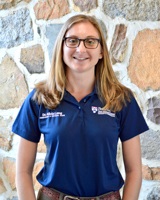 Kara Brown, VMD, DACVSMR, is an Assistant Professor of Equine Sports Medicine and Rehabilitation in the Department of Clinical Studies—New Bolton Center. After completing her veterinary degree at the University of Pennsylvania in 2014, she went on to complete two large animal rotating internships, one at Woodside Equine Clinic in Ashland, VA, and the other at the University of Pennsylvania, New Bolton Center. She then completed a fellowship in Large Animal Cardiology and Ultrasound, and a residency in Equine Sports Medicine and Rehabilitation, also at New Bolton Center, during which time she additionally received specialty training in equine rehabilitation through the Animal Rehabilitation Institute. She became a diplomate of the American College of Veterinary Sports Medicine and Rehabilitation in 2021. She remained at New Bolton Center for three years as a Lecturer in Equine Sports Medicine prior to beginning her faculty appointment. Her clinical and research interests include the diagnosis and treatment of poor performance in equine athletes, axial skeletal pain in horses, and evidence-based rehabilitation strategies.
Kara Brown, VMD, DACVSMR, is an Assistant Professor of Equine Sports Medicine and Rehabilitation in the Department of Clinical Studies—New Bolton Center. After completing her veterinary degree at the University of Pennsylvania in 2014, she went on to complete two large animal rotating internships, one at Woodside Equine Clinic in Ashland, VA, and the other at the University of Pennsylvania, New Bolton Center. She then completed a fellowship in Large Animal Cardiology and Ultrasound, and a residency in Equine Sports Medicine and Rehabilitation, also at New Bolton Center, during which time she additionally received specialty training in equine rehabilitation through the Animal Rehabilitation Institute. She became a diplomate of the American College of Veterinary Sports Medicine and Rehabilitation in 2021. She remained at New Bolton Center for three years as a Lecturer in Equine Sports Medicine prior to beginning her faculty appointment. Her clinical and research interests include the diagnosis and treatment of poor performance in equine athletes, axial skeletal pain in horses, and evidence-based rehabilitation strategies.
 Emmelyn Hsieh, DVM, DACVIM (SAIM), is an Assistant Professor of Medicine in the Department of Clinical Sciences and Advanced Medicine. She obtained her DVM in 2018 from the University of California, Davis, then undertook a small animal rotating internship at the University of Minnesota. She then moved back to the University of California, Davis to complete a small animal internal medicine residency followed by a clinical infectious disease fellowship. Her research interests include infectious diseases, specifically antimicrobial stewardship and resistance and tracking antimicrobial use within various hospital settings. She also has an interest in lower urinary tract diseases.
Emmelyn Hsieh, DVM, DACVIM (SAIM), is an Assistant Professor of Medicine in the Department of Clinical Sciences and Advanced Medicine. She obtained her DVM in 2018 from the University of California, Davis, then undertook a small animal rotating internship at the University of Minnesota. She then moved back to the University of California, Davis to complete a small animal internal medicine residency followed by a clinical infectious disease fellowship. Her research interests include infectious diseases, specifically antimicrobial stewardship and resistance and tracking antimicrobial use within various hospital settings. She also has an interest in lower urinary tract diseases.
 Alicia Long, DVM, DACVIM (LA), DACVECCS, is an Assistant Professor of Large Animal Emergency and Critical Care in the Department of Clinical Studies—New Bolton Center. She received her veterinary degree in 2012 from the Virginia Maryland College of Veterinary Medicine in Blacksburg, Virginia. She then completed a rotating internship in equine medicine, surgery, anesthesia, and ambulatory practice at Rhinebeck Equine, LLC in Rhinebeck New York, followed by a second internship in a combined program with the Tufts University Cummings School of Veterinary Medicine as a large animal medicine intern and the Massachusetts Equine Clinic as an equine ambulatory intern. After this Dr. Long came to the University of Pennsylvania’s New Bolton Center for a residency in large animal internal medicine, followed by a fellowship in large animal emergency and critical care. After this time, she was hired on as an Assistant Professor of Large Animal Emergency and Critical Care. Her research interests focus on the equine intestinal microbiome and its relationship to equine colic, particularly recurrent colic.
Alicia Long, DVM, DACVIM (LA), DACVECCS, is an Assistant Professor of Large Animal Emergency and Critical Care in the Department of Clinical Studies—New Bolton Center. She received her veterinary degree in 2012 from the Virginia Maryland College of Veterinary Medicine in Blacksburg, Virginia. She then completed a rotating internship in equine medicine, surgery, anesthesia, and ambulatory practice at Rhinebeck Equine, LLC in Rhinebeck New York, followed by a second internship in a combined program with the Tufts University Cummings School of Veterinary Medicine as a large animal medicine intern and the Massachusetts Equine Clinic as an equine ambulatory intern. After this Dr. Long came to the University of Pennsylvania’s New Bolton Center for a residency in large animal internal medicine, followed by a fellowship in large animal emergency and critical care. After this time, she was hired on as an Assistant Professor of Large Animal Emergency and Critical Care. Her research interests focus on the equine intestinal microbiome and its relationship to equine colic, particularly recurrent colic.
 Wojciech K. Panek, DVM, DACVM, is an Assistant Professor of Neurology and Neurosurgery in the Department of Clinical Sciences and Advanced Medicine. He graduated from Wroclaw University of Environmental and Life Sciences, Poland. Following rotating and surgical internships, he completed a 2-year neuro-oncology fellowship at NU, Feinberg School of Medicine in the Department of Neurology/Neurosurgery, Chicago, IL. He then went on to complete a 2-year fellowship focusing on neuro-aging in companion dogs at NC State University, followed by a 3-year neurology and neurosurgery residency program at UC Davis. His research includes translational neuro-oncology and neuro-aging and primarily focuses on developing a comprehensive understanding of the regulatory signals that govern the immune system mobilization and/or exhaustion in patients suffering from CNS tumors and canine cognitive dysfunction.
Wojciech K. Panek, DVM, DACVM, is an Assistant Professor of Neurology and Neurosurgery in the Department of Clinical Sciences and Advanced Medicine. He graduated from Wroclaw University of Environmental and Life Sciences, Poland. Following rotating and surgical internships, he completed a 2-year neuro-oncology fellowship at NU, Feinberg School of Medicine in the Department of Neurology/Neurosurgery, Chicago, IL. He then went on to complete a 2-year fellowship focusing on neuro-aging in companion dogs at NC State University, followed by a 3-year neurology and neurosurgery residency program at UC Davis. His research includes translational neuro-oncology and neuro-aging and primarily focuses on developing a comprehensive understanding of the regulatory signals that govern the immune system mobilization and/or exhaustion in patients suffering from CNS tumors and canine cognitive dysfunction.